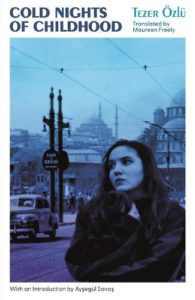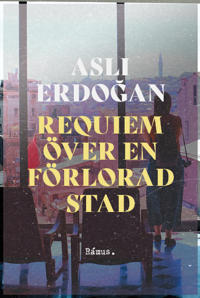I was debating whether to make this one post or two, and in the end decided to make this a single post for a variety of reasons:
- In terms of sheer practicality, my posting schedule and reading schedule are such that my usual rate of posting will have me bleeding 2023’s books into 2024, which I emphatically do not like.
- These are authors that are in a kind of dialogue with each other, or rather one of them is clearly inspired by the other.
- The books themselves were even very similar in terms of mood, themes, structure, etc.
- I didn’t have much to say about either book on their own.
So, first of all, which books are we talking about?
The first was a Swedish translation of Aslı Erdoğan‘s Requiem över en förlorad stad. I read an interview with her in an old issue of Karavan that I brought with me on vacation for airplane reading; in the end I was so taken by how insightful and interesting and brainy she was that when I got back to Stockholm I immediately grabbed what book of hers I could from the library.
The second book was a recommendation from a American friend now residing in Turkey that served to underscore an author I had apparently added to my Storygraph TBR (probably mentioned in the same issue of Karavan): Tezer Özlü. An English translation of her Cold Nights of Childhood was published this year, which I was able to track down at the Stockholm library.
My process was something like this:
- Read Erdoğan
- Solicit an opinion on her from a bookish American friend in Turkey, who recommends Özlü
- Read Özlü
As you might guess from that turn of events, I wasn’t entirely taken with Requiem. It’s a lot of mood and imagery and lovely turns of phrase, but nothing I could really sink my teeth into (or that I can remember now, at the time of writing, a week or two later). Trying to summarize the book is a struggle: “unnamed woman wanders around an unnamed city at night”? I guess?
My best explanation is that Requiem functioned as a sort of literary therapy for Erdoğan, and therefore concrete experiences are abstracted into an etheric dream world rather than relived in all their terror. Art as a process rather than a product, written for Erdoğan and not for an audience. The end result is that I would finish each chapter unsure of what happened and without any sense of the human being behind the words, and that last point is ultimately the make or break thing for me.
As Bookish American friend in Turkey tactfully put it, Erdoğan’s literary reputation might be overstated due to her (obviously important and brave and impressive!) political activism. But I also get the sense that Requiem is a very different beast than her earlier books, so perhaps I don’t have an entirely fair picture of her work. The same bookish friend also tipped me off that Tezer Özlü had finally been published in English for the first time, in an off-the-cuff follow-up to her estimation of Erdoğan that implied a comparison in Özlü’s favor.

What bookish American friend couldn’t have known, or maybe she did, was that Requiem reads like a riff on, and a response to, Cold Nights of Childhood. Both books ground a woman narrator in a city (or several cities) as she wanders not only through space but also through time, emptying their memories on the page the same way you empty your pockets before throwing a pair of pants in the wash. But if Requiem is an etheric and abstract dream world, then Cold Nights is waking life, or maybe better put a lucid dream. Instead of fuzzy, surreal abstraction, Özlü names everything with precision and clarity: people, streets, cafes, flowers. The same clarity holds throughout, even as the narrative skips through time or across space; she eschews poetic metaphor and favors stark depictions of her external circumstances and experiences, whether it’s stays at psychiatric wards or adolescent sexual desire or family gatherings in their cramped rural home. I might not have learned anything about Özlü by the end of Cold Nights, but unlike Requiem I still felt like I had met her. All of the English summaries make comparisons to The Bell Jar and it’s honestly a pretty apt one.
Both of these books raise the question of I’ve been taught to expect in stories, not only through school and writing advice, but also in the kinds of stories available for consumption in popular culture. Building expectations through repetition is another way of teaching, after all, and the stories in most conventional media usually have story arcs, character arcs, conflicts, changes, a sense of narrative unity. By the end of the story, situations and characters should be different from how they started, and we should be able to clearly trace the progression of those changes. How many of these expectations can go unmet and a story (a book, a movie, a TV show) still be satisfying? How else can we look at stories? What other shape can they take? What other purpose can they serve?


2 thoughts on “Turkish Tag Team: Requiem över en förlorad stad during Cold Nights of Childhood”